By Ludwig Dyck
By the summer of 55 bc, 45-year-old Roman proconsul Gaius Julius Caesar was a veteran military campaigner. For the past three years, under his lead, the tramp of hobnailed sandals had resounded across the countryside of Gaul, the westernmost province of the Roman empire. Time and again, Caesar’s iron legions had subdued the warlike Celts and hurled back German intrusions across the Rhine. The victories, as intended, had won Caesar increasing renown in the political arena of Rome, and had also earned him the undying loyalty of his own hardbitten troops. As the current campaign season neared its end, Caesar considered Gaul sufficiently subjugated to allow him to cross the 30-mile-wide stretch of open water known as Oceanus Brittanicus for his next great adventure: the invasion of mysterious, fog-enshrouded Britannia. Caesar intended to punish the Briton tribes for aiding their Gallic kinsmen in the past and—not incidentally—to win himself even more martial glory.
With little time left before the onset of cold weather, Caesar decided to limit the new expedition to a reconnaissance force. Even this comparatively modest enterprise was fraught with danger, beginning with the fact that neither Caesar nor any of his subordinates knew anything about the island they were preparing to invade. The Britons, it was rumored, followed a strange pagan religion, known as druidism, whose rites included human sacrifice. They controlled vast riches of gold, silver, pearls and tin, raised large herds of cattle and traded cannily with their neighbors across the water. Beyond that, the Gauls could tell the Romans very little. As Caesar remembered in his Commentaries, “The Gauls knew next to nothing. No one as a rule goes to Brittania except traders, and these traders are themselves acquainted only with the sea coast and coastal regions opposite Gaul. So, though I made enquiries of all the traders I could find, I could get no information.”
At the time, Britannia’s maritime tribes consisted of the people known as the Belgae. A Celtic culture with Germanic ancestry, the Belgae had migrated to the island from the European mainland towards the end of the second century bc. Like the Gauls, the maritime tribes were primarily an agricultural and cattle-rearing society. They brought with them town-sized settlements ruled by wealthy chiefs who patronized skilled metal smiths and potters. Caesar had fought the Belgaes’ continental brothers two years earlier in northeastern Gaul, and although he had forced them to submit, he had taken away a healthy respect for their courage—he called them “the bravest of the Gauls.” In contrast, he knew nothing about the tribes north of the River Thames in the interior of Brittania. They were of older Celtic stock, their ancestors having arrived on the island sometime after 900 bc, long before the Belgae. According to Caesar, the northern tribes were more primitive, subsisting primarily on meat and milk. Peculiar customs among the Britons included the sharing of wives between male family members and an unaccountable disdain for the meat of hare, fowl and goose, which instead were kept as pets. Such finely tuned dining distinctions struck the more practical-minded Romans as odd.
Wanting to find out more about his prospective enemies, Caesar dispatched one of his officers, Gaius Volusenus, on a scouting expedition. Volusenus explored the British coastline for suitable landing sites, but was too timid to go ashore himself. Meanwhile, at Portus Itius, Caesar reassembled the fleet he had used a year earlier in the naval battles against the maritime tribes of Aremorica. Portus Itius was in the territory of the Morini, a continental Belgae tribe. From there, the journey across the channel to Brittania was the shortest. Fortunately for Caesar, several Morini cantons, which earlier had defied Roman annexation, had had a change of heart and offered hostages as a sign of submission. More good news came with the arrival of Briton tribal envoys. Having heard of Caesar’s aggressive intentions through friendly sea traders, they offered hostages as well. Caesar in turn made them promises of goodwill.
On the eve of their return to Britannia, Caesar asked Commius, one of the continental Belgae kings, to accompany the Briton envoys and spread the word of proferred Roman friendship. Commius, who owned his leadership of the Atrabetes tribe to Caesar’s largesse, supposedly enjoyed the Britons’ respect. He was instructed “to visit as many of the tribes as possible, to persuade them to place themselves under the protection of Rome, and to announce that Caesar himself would shortly be arriving.” Commius, however, was sailing into trouble, for the show of Briton goodwill soon would prove to be an illusion. Once ashore in Britannia, he and his 30-man advance troupe were thrown unceremoniously into fetters. At midnight on August 25, 80 Roman transports carrying Caesar and his Seventh and Tenth legions, escorted by a flotilla of war ships, sailed off into darkness for the mysterious shores of Britannia. Nine hours later, the Roman fleet beheld the white cliffs of Dover towering far above the narrow shoreline below. Not one of the legionaries on board knew anything about the land they were about to invade. Indeed, some Roman scholars had speculated that the isle was simply a figment of the imagination. But the cliffs at Dover were real, as were the rows of seething Britons gathered atop the cliffs to welcome them—not with open arms but with volleys of stones and javelins.
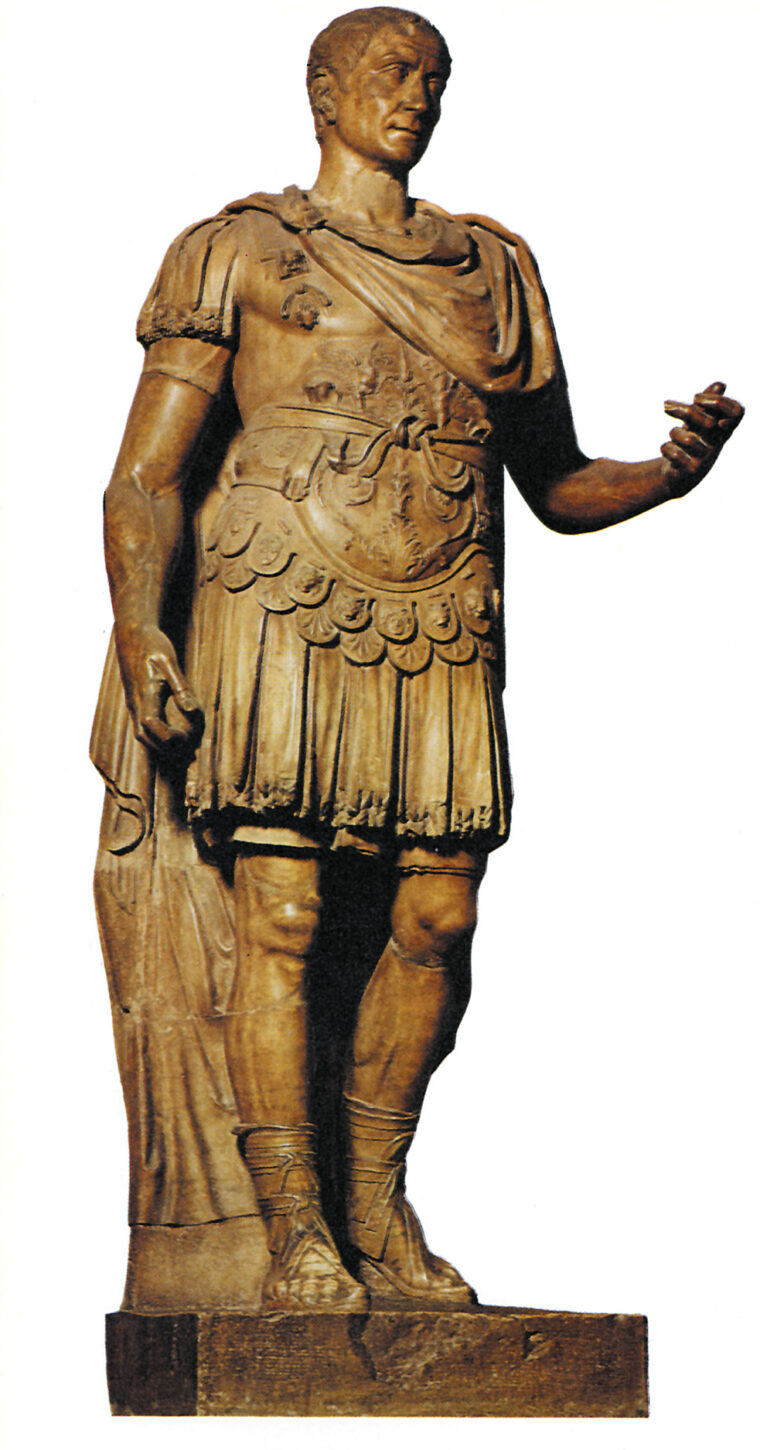
Caesar, expecting a friendlier greeting, gathered his legates, tribunes, centurions and other major commanders for a consilium, or war council, on his ship. He listened carefully to their opinions and warned them of the inherent dangers of a naval operation. Scanning the high cliffs that frowned over the narrow beach at Dover, Caesar decided against a landing there. “It seemed to me,” he said later, “an extremely bad place for a landing.” Based on the sketchy information gathered by Volusenus, he hugged the coastline for another eight miles until the cliffs gave way to open shores at Deal. There, the Romans warily prepared to disembark. The Britons, however, would not be avoided so easily. Their cavalry and charioteers, with infantry in their wake, shadowed Caesar’s fleet every step of the way. With the Britons milling about on the beach, the great Roman ships dropped their anchors. Centurions shouted orders, their aides, called optiones, gestured with their staffs, circular horns blared and legionaries leapt into the silty water.
Burdened by their heavy arms and pounded by waves and treacherous rip currents, the legionaries were barely able to keep themselves upright. Meanwhile, the Britons rained down javelins and stones. Exhausted, many wounded Romans drowned in waist-deep water, the blood of their limp bodies clouding the bay. Briton cavalrymen spurred their steeds through the water, throwing salty spray into the legionaries’ eyes. To the Romans, dazed by fear, surprise and exhaustion, the Britons appeared as horrifying apparitions, long wild hair and mustaches blowing in the breeze, bodies completely shaved and dyed a startling color of blue. Instinctively, the legionaries raised their shields to block the savage spear thrusts and swords swinging down at them. But the strain proved too much even for Caesar’s veteran campaigners. Unable to press forward, their characteristic resolve began to waver.
Caesar watched anxiously as the amphibious assault became bogged down and seemed critically close to turning into a rout. To bolster his hard-pressed legionaries, he ordered the offshore warships to provide support fire. The eyes painted above the rams of the great Roman war galleys turned ominously toward the shore. Horns blew and whips cracked over the lean, muscled backs of the galley slaves, crisscrossed with scars from the rowing master’s lash. Hundreds of sweat-drenched slaves, chained to the ship, bent to multiple banks of oars thrashing the water. Onward the galleys sped until, like gigantic wooden whales, they beached themselves on the enemy’s right flank. From their decks spewed forth a devastating array of slings, arrows and catapulted rocks.
hocked and frightened by the Romans’ resolve, the Britons momentarily pulled back from the beach. This left an opening for the legionaries, who stormed ashore with renewed vigor. Seeing the men rally, the imperial standard-bearer of the Tenth Legion cried, “Leap down, soldiers, unless you wish to betray your eagle to the enemy; it shall be told that I at any rate did my duty to my country and my general.” With those words he cast himself into the sea, to bear the gold-plated, eagle-topped standard foward against the Britons.
Everywhere the Romans were gaining the beachhead, only to meet a renewed charge by the Britons. Unable to form up in proper formation, the legionaries were still hard pressed. Isolated Romans found themselves surrounded and cut down in the shallows, the salty foam washing crimson around their bodies. Again Caesar reacted quickly and decisively, ordering the warships’ boats and scout ships loaded with fresh troops and sending them into the fray at critical points. Once the disciplined legionaries gained dry ground in sufficient numbers, the tide turned against the gallant but disorganized Britons, who fled for their lives into the distant woods. Fortunately for them, Caesar had no mounted pursuit to muster because unfavorable winds had delayed the crossing of his cavalry transports.
Once again envoys arrived from the Briton tribes, seeking pardon and asking Caesar for forgiveness. In return for Commius and the other hostages, Caesar accepted their renewed offer of peace. He was not, however, in any doubt that the Britons, like the Gauls, would take up arms again at the slightest favorable opportunity.
Such an opportunity soon developed when a furious storm kicked up at the very moment that the long-delayed cavalry transports were finally seen offshore from Caesar’s camp. The transports were unable to make a landing, and instead were blown back out to sea (they eventually returned to Gaul). Worse yet, during the night the storm played havoc with the Roman warships, which had been pulled up onto shore. The unusually high tide tossed the boats about like kindling and the ships’ groaning and creaking timbers could be heard over the din of the storm. The Romans watched helplessly as their transports and great galleys were torn to pieces. Even those that made it through the night were severely damaged and unable to sail.
The morale of the men sunk like their ships. “The whole army,” said Caesar, “was filled with consternation.” They were effectively stranded in Britannia, on unknown shores, without adequate food supplies for the coming winter.
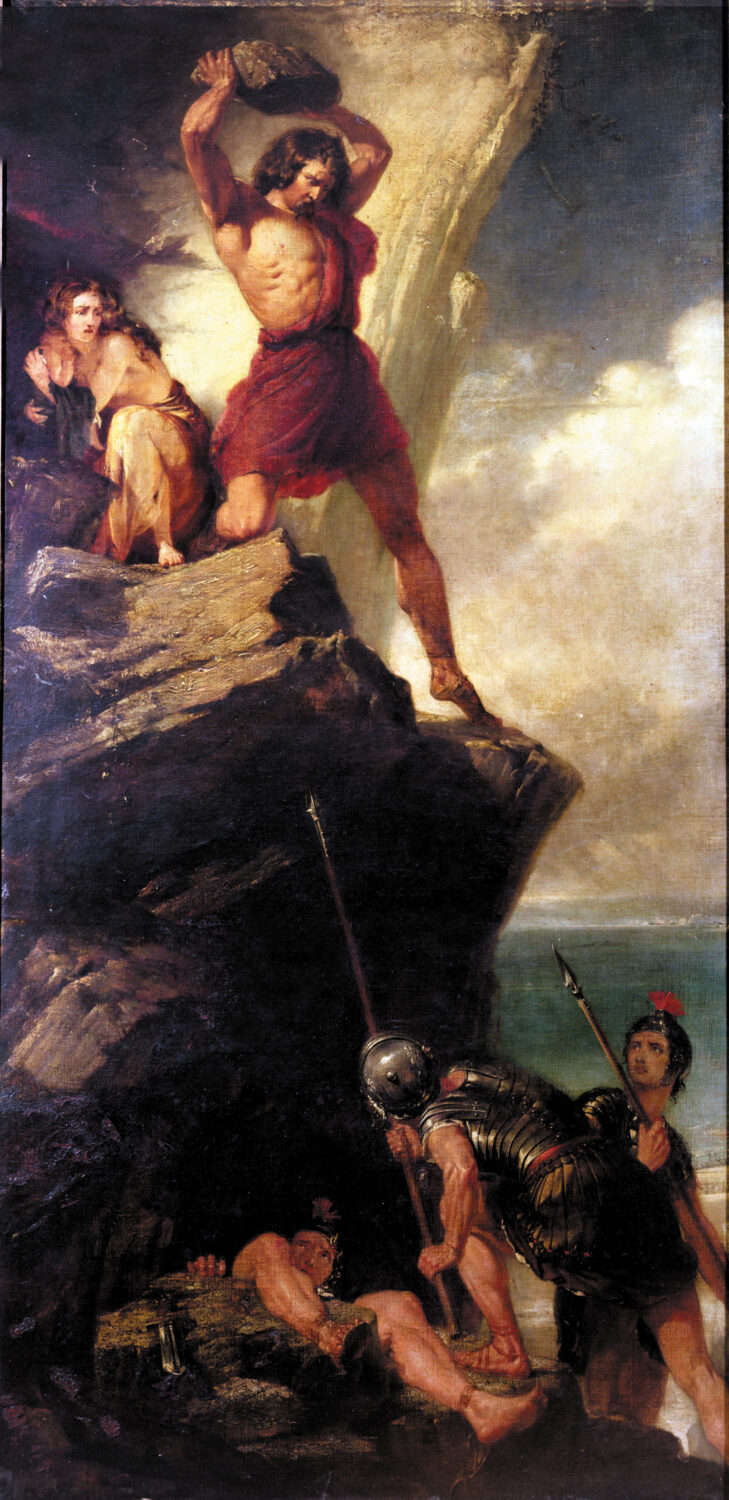
The Britons celebrated the Romans’ misfortune by renewing hostilities, intent on prolonging them into the cold season, when hunger alone might force the invaders to succumb. But Caesar confronted his plight with characteristic resolve. Timber and bronze from the most damaged ships were cannibalized to repair the rest, and all but 12 of the ships were made seaworthy again.
To deal with his supply problem, Caesar sent soldiers into the nearby fields to gather wheat. At first this was accomplished with little opposition from the natives, some of whom became regular visitors to the Roman camp. However, one day the guards in front of the camp gate noticed a massive dust cloud in the distance. The cloud arose from the direction in which the Seventh Legion had gone to harvest wheat. It could mean only one thing—a battle was raging.
Caesar quickly collected some cohorts and sped toward the commotion. Sure enough, he found the Seventh Legion hard-pressed on all sides by the Britons, who were pelting the legionaries with missiles. The Britons had approached the area at night and hidden in the woods. While the legionaries were scattered and busy cutting wheat, the barbarians suddenly burst upon them from ambush. The whistling of Briton javelins was accompanied by the rending of Roman mail, and a few of the legionaries fell dead immediately. The remainder hastened to form rough ranks, while all around them galloped Briton cavalry and chariots. Superb charioteers, the Britons raced about wildly, the horses and wheels raising a terrifying clamor. One Briton steered each team while a comrade hurled javelins at the Romans, then sprang to the ground to fight alongside the infantry.
Caesar’s arrival caused the Britons to halt their attack, fearing that he was leading a massive countermove. Caesar used the opportunity to withdraw to his shoreside camp. For the next several days, stormy weather prevented renewed hostilities and gave both sides a break from the constant fighting. The legionaries rode out the rains huddled in their goathide tents, while Briton messengers rallied support in the outlying farmsteads. As soon as the skies cleared, the Britons attacked again in greater numbers. Unshaken, the legionaries formed their unbreakable ranks, and aided by 30 horsemen led by the newly freed Commius, they easily repulsed the attackers. The Romans harried after their beaten foes, swords and spears cutting them down on the run. Outlying homes were set to the torch; flames flickered from timber beams and straw roofs. Once again the Britons came to offer peace and surrender hostages–but now Caesar had had enough. The storms were followed by a spell of fair weather as Sol, the sun god, smiled on the Romans. With the fall equinox fast approaching, Caesar decided to leave Brittania while he still could. At midnight, he weighted anchor and set sail for Gaul.
Caesar had been gone from Gaul for less than three weeks, but in his absence the Morini had revolted again. Now they gave Caesar a rude surprise by forcibly contesting his return landing. Only after hours of battle were they driven off. There followed the usual Roman reprisal raids, after which Caesar stationed his entire army in winter quarters among the troublesome Belgae.
The Senate then got word of Caesar’s latest victories—vastly inflated by the proconsul’s own self-congratulatory account—and decreed an unprecedented 20 days of public thanksgiving. But did Caesar really deserve his latest acclaim? He had put himself and two of his best legions at risk merely to sortie briefly in a distant, unimportant country. Moreover, the numerous native rebellions demonstrated that the Gallic tribes only remained conquered as long as a large Roman force was stationed among them. It had been a year of tactical but not strategic victories, and no less an expert than Napoleon Bonaparte later called Caesar’s Britannia campaign a “second class operation.”
Caesar was well aware of the shortfalls of his first Britannia campaign. Accordingly, before he left for Italy, he ordered the construction of several new ships. Based on his recent experiences, the ships would need to be designed for a beach landing, quick loading and disembarking, and be better able to deal with the local tides. As a result, the new troop ships were smaller, while those for the cavalry, draught animals, and cargo were broader. Both could be propelled by oar or sail. For his own part, Caesar would not be idle during the winter. There were assizes to be held in northern Italy and Illyricum, barbarian raiders to be dealt with along the border, and an anti-Roman faction among his Gallic Treveri allies to be put down. In between dealing with all these problems, Caesar toured his army’s winter quarters. With materials brought from Spain, and through the nearly superhuman efforts of his legionaries, 600 new ships were built, along with 28 traditional war galleys.
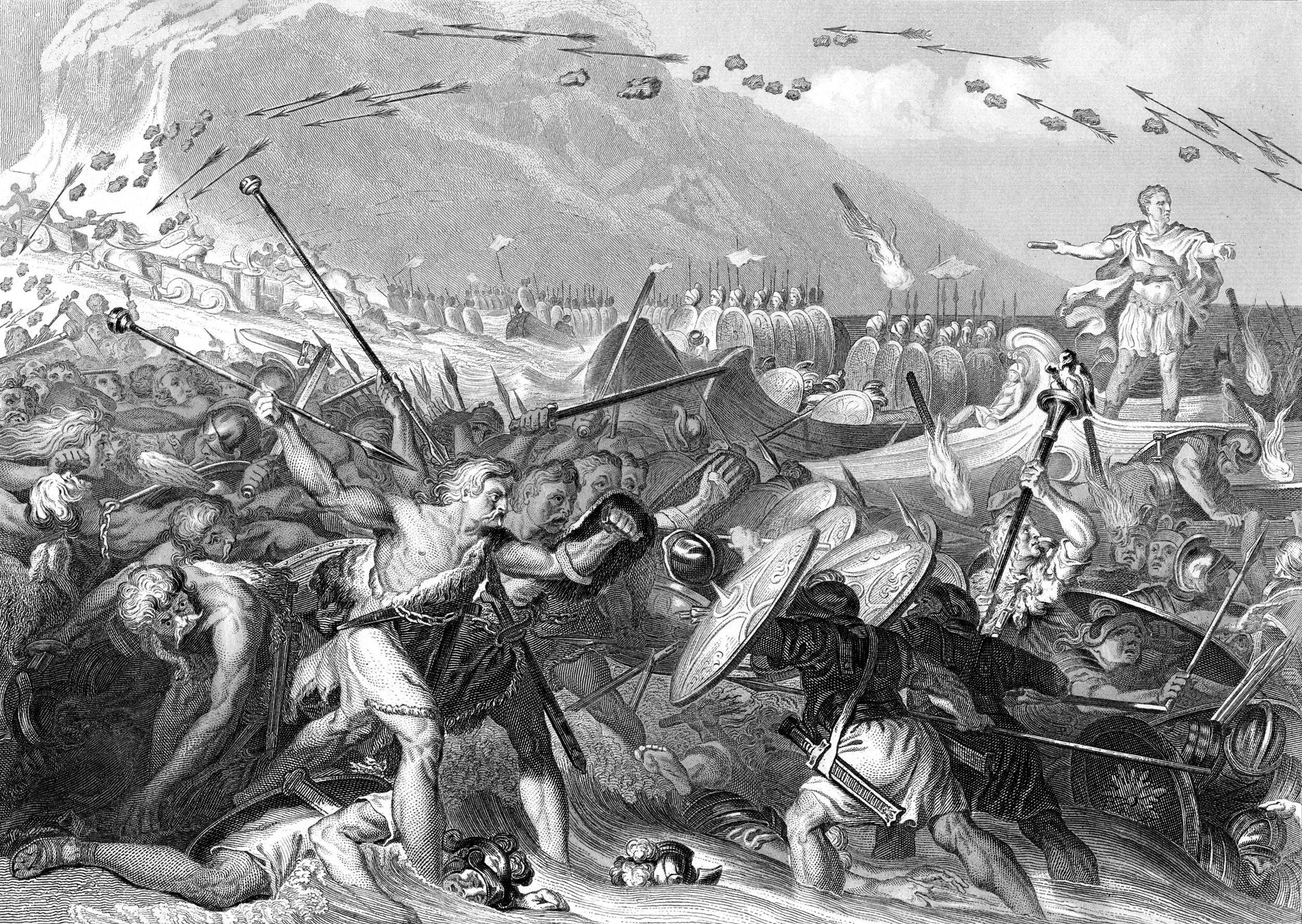
In the fading light of an early July day in 54 bc, Caesar’s armada once again weighed anchor at Portus Itius. The sails of 800 ships billowed in the wind. On board were five legions with a total of 25,000 troops and an additional 2,000 cavalry, the latter being made up of allied Gauls and smaller numbers of elite German and Spanish troops. Remaining on the continent to protect the ports and keep an eye on Gaul were three legions and 2,000 cavalry.
This time the mere sight of Caesar’s mighty armada so intimidated the Britons gathered on the shoreline that they hastily withdrew without a fight. At midday, the legionaries stepped unopposed onto the sandy beach. Caesar left behind 10 cohorts and 300 cavalry under Quintus Atrius, and with the rest of his men pressed after the enemy.
After a night march of 12 miles, the Romans sighted the enemy early the next day. Near a river the Britons attacked with cavalry and chariots, but this time Caesar had his own cavalry handy and drove the Britons back into a nearby wood. Amid the trees and foliage, the Britons took refuge behind ramparts made of felled trees. The soldiers of the Seventh Legion countered by throwing up their own earthen ramp. With shields locked above their heads, the legionaries formed the classic “tortoise” maneuver. Missiles struck the stout double layers of the 4-foot-by-2-foot scutum and ricocheted off. The Romans easily breached the Briton ramparts and drove the enemy out of the woods. Although Roman casualties were light, Caesar delayed a pursuit since he was unsure of the terrain ahead.
At daybreak bad news arrived from the fleet, and Caesar returned to his coastal camp. Storms had struck again, ripping apart another 40 ships and damaging most of the others. Caesar dispatched messages to the continent for replacement ships, while the legionaries, many of who were skilled tradesmen, carried out a new round of repairs. To prevent further damage, Caesar beached all the ships and connected them to the camp by digging an entrenchment. Wooden stakes were hammered into the rampart and lashed together to form a palisade. After 10 days of round-the-clock labor, the legionaries completed the backbreaking work.
With the same force as before, Caesar set out again to confront the Britons. The natives had used the extra time to reassemble with additional reinforcements under the command of a tribal leader named Cassivellaunus. The new Briton warlord unleashed his cavalry and chariots on the marching Roman columns. Javelins hurled through the air, skewering Roman shields or thudding into the ground. Expert marksmen, Celtic slingers dashed in Roman helmets with their stones. Instantly, the Roman auxiliary cavalry bolted into action, at which time the Britons reined in their own horses and whipped their chariots back to the safety of nearby woods and highlands. Long swords parried and slashed as the Britons turned on their overeager pursuers.
Another surprise attack came from the woods while the legions were setting up camp. Caesar sent elite cohorts from his two legions to confront the attackers. The Britons were nearly caught between the shield walls and sword blades of the onrushing cohorts, but a mad dash by the Britons unnerved the Romans. More cohorts had to be rushed into action to clear the field. A pattern of fighting emerged. The Britons would strike suddenly and then disengage before the Romans could mount a counterattack. The skirmishing tactics were disadvantageous to the legionaries, who preferred a set battle, and highly dangerous to the undersized Roman cavalry, which could be lured away into an ambush.
The next day, Caesar sent Gaius Trebonius back out to forage with three legions and a large force of cavalry. Caesar stayed behind to hold the camp with the rest of the troops. It was the opening the Britons had been waiting for. Throngs of blue-painted barbarians swept down upon Trebonius from all sides. With wild, howling savages all around them, a lesser army would have panicked. But hard training and discipline paid off for the Romans. The legionaries stoutly formed their lines, drew their swords, and forced their attackers to scatter. The nimble Britons tried to reform, but Roman cavalry kept at their heels, hacking and slashing away, and left the field strewn with Briton dead and wounded.
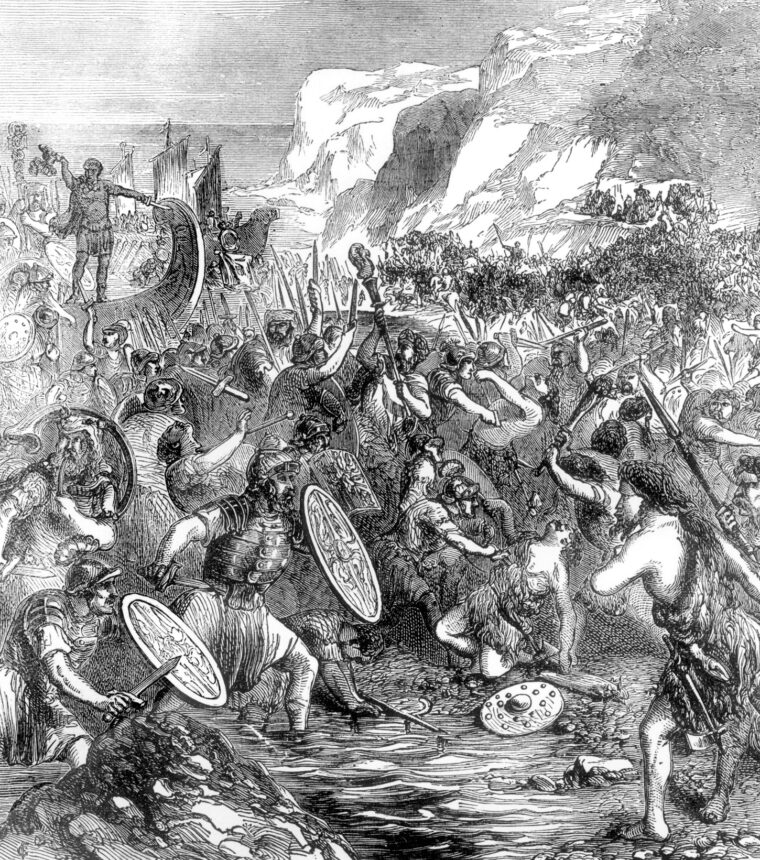
Caesar pushed on toward the River Thames. Near Brentford, the river was shallow enough to cross by foot. The Britons, behind rows of sharp projecting stakes, held the opposite bank. Undaunted, the legionaries and cavalry plunged into the river. Although weighed down by 30-pound mail shirts, shields and helmets, the legionaries waded unhesitatingly through water that rose at times to their necks. The Romans’ speed and aggression terrified the Britons, who fled without putting up much of a fight. After the setback, Cassivellaunus disbanded the greater part of his army and returned to his harrying tactics with his 4,000 remaining charioteers.
Celtic disunity once again played in Caesar’s favor. With Cassivellaunus unable to defeat the Romans, the powerful Trinovantes tribe sought an alliance with Caesar. Their lands lay to the east of Cassivellaunus’s territory, just north of the Thames estuary. Cassivellaunus had formerly slain the king of the Trinovantes but the king’s son, Mandubracius, escaped his father’s fate and fled to Gaul, where he joined Caesar’s entourage. The Trinovantes asked Caesar to reinstate Mandubracius as their head of state. He complied and was rewarded with the submission of most of the maritime tribes, except those from Cantium (Kent). Caesar was told the location of Cassivellaunus’ stronghold–a guerrilla base in the deep woods around Wheathamstead that boasted a formidable rampart and trench. Attacking quickly, Caesar overwhelmed the defenses with a violent two-pronged assault.
Meanwhile, Cassivellaunus had ordered the four kings of Cantium to assault the Roman naval camp at Sandwich. The Kentish forces were unable to overcome the Roman defenses, and were easily dispersed. The murderous blades of the 16-inch gladius exacted a terrible toll. Ever since Caesar had crossed the Thames, the Briton will to fight had been lackluster—their morale was broken.
Without allies and with nothing but defeats to show for his troubles, Cassivellaunus decided to sue for peace. Luckily for him, the usual rumors of unrest in Gaul induced Caesar to return his troops to the continent for the winter. With Commius acting again as intermediary, Cassivellaunus escaped with the loss of a few hostages, a promise to not make war on Mandubracius, and an agreement to pay an annual tribute to Rome.
When Caesar’s entire army returned to Gaul at summer’s end, his second expedition to Britannia had proved no more successful than his first. With no permanent Roman garrisons in Britannia, the alliances and submissions of the native tribes were meaningless, and it was doubtful that any future tribute would ever be paid to Rome. Still, the legionaries had fought with their usual valor, and Caesar had added another page of victories to his long list of military accomplishments. More of Britannia had been explored and a number of new hostages had been taken. If the ultimate aim was to deter further Briton aid to their cousins in Gaul, then Caesar’s expedition could be judged a success. In Rome, however, the reaction was muted—at least in the Senate—and there were no new displays of public thanksgiving. The prominent politician Cicero, for one, noted the conspicuous lack of war booty needed to feed the insatiable Roman war machine.
Back in Britannia, Cassivellaunus resumed efforts to extend his sway. In time he was joined by none other than Commius, who turned on Caesar and eventually had to flee Gaul. Cassivellaunus’ dynasty came to rule over much of the southern part of the isle, ironically profiting from the flourishing trade with the Roman world that sprang up in the wake of Caesar’s two ill-starred expeditions.
The Roman eagle had fastened its talons briefly on Britannia, only to release them just as swiftly. Caesar would not return to Britannia. Gaul, devastated by war, boiled over with insurrections that would bring Caesar to the brink of defeat and occasion his fateful crossing of the Rubicon, plunging Rome into civil war. Meanwhile, Britannia remained free from further Roman interference. It would be another century, during the reign of Emperor Tiberius Claudius Drusus, before the Britons would again feel the cold touch—and colder steel—of Rome.
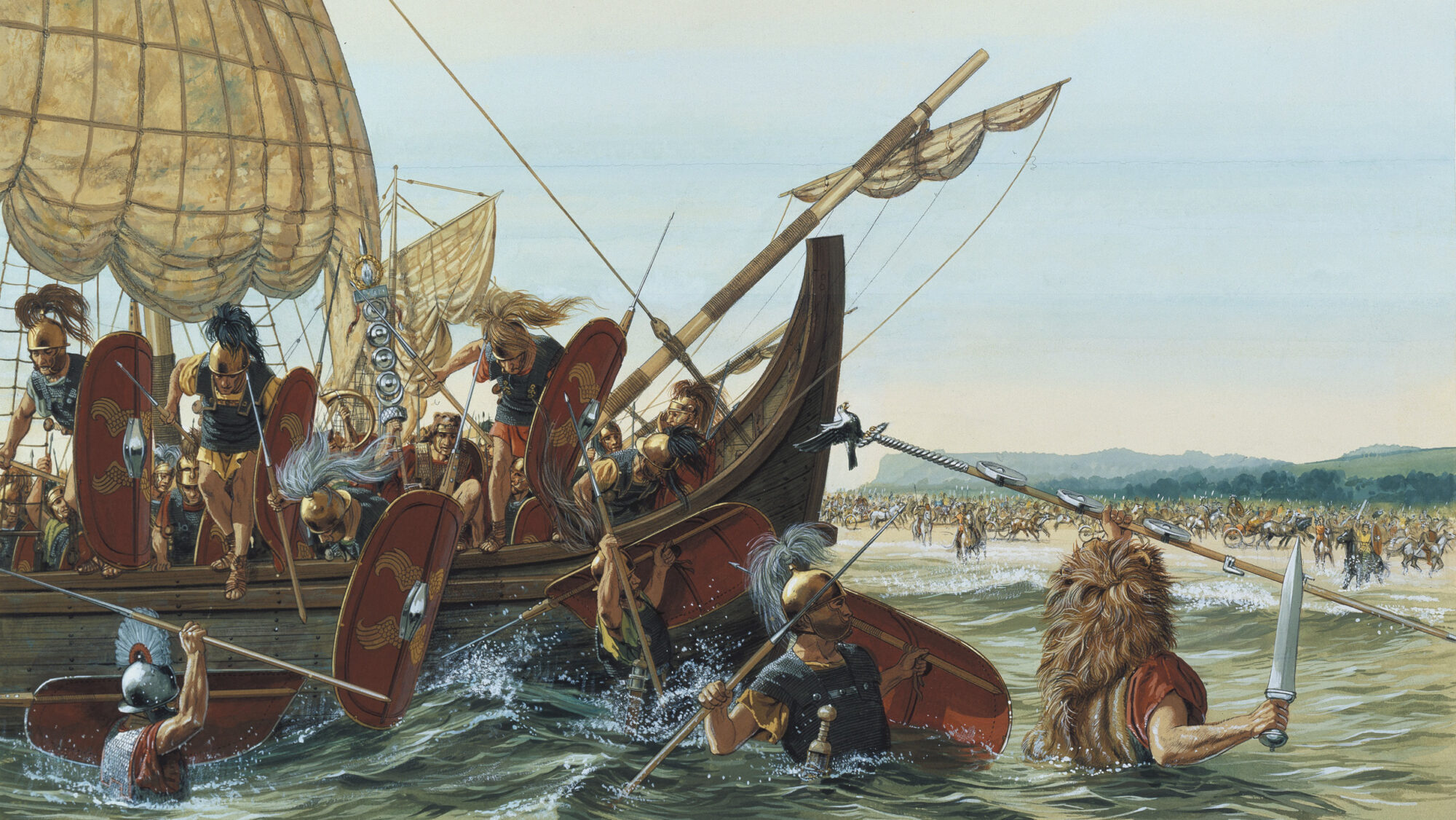
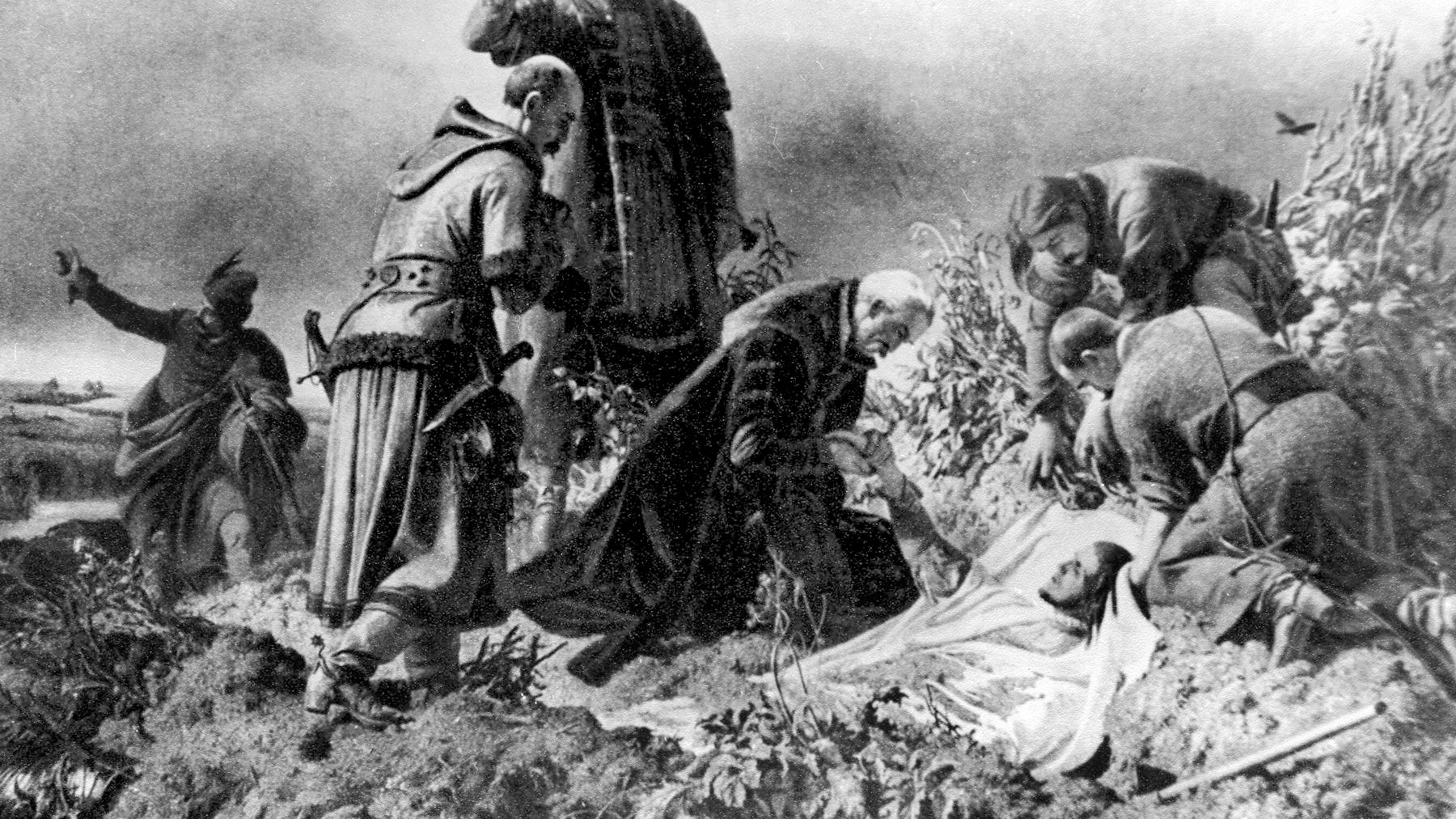
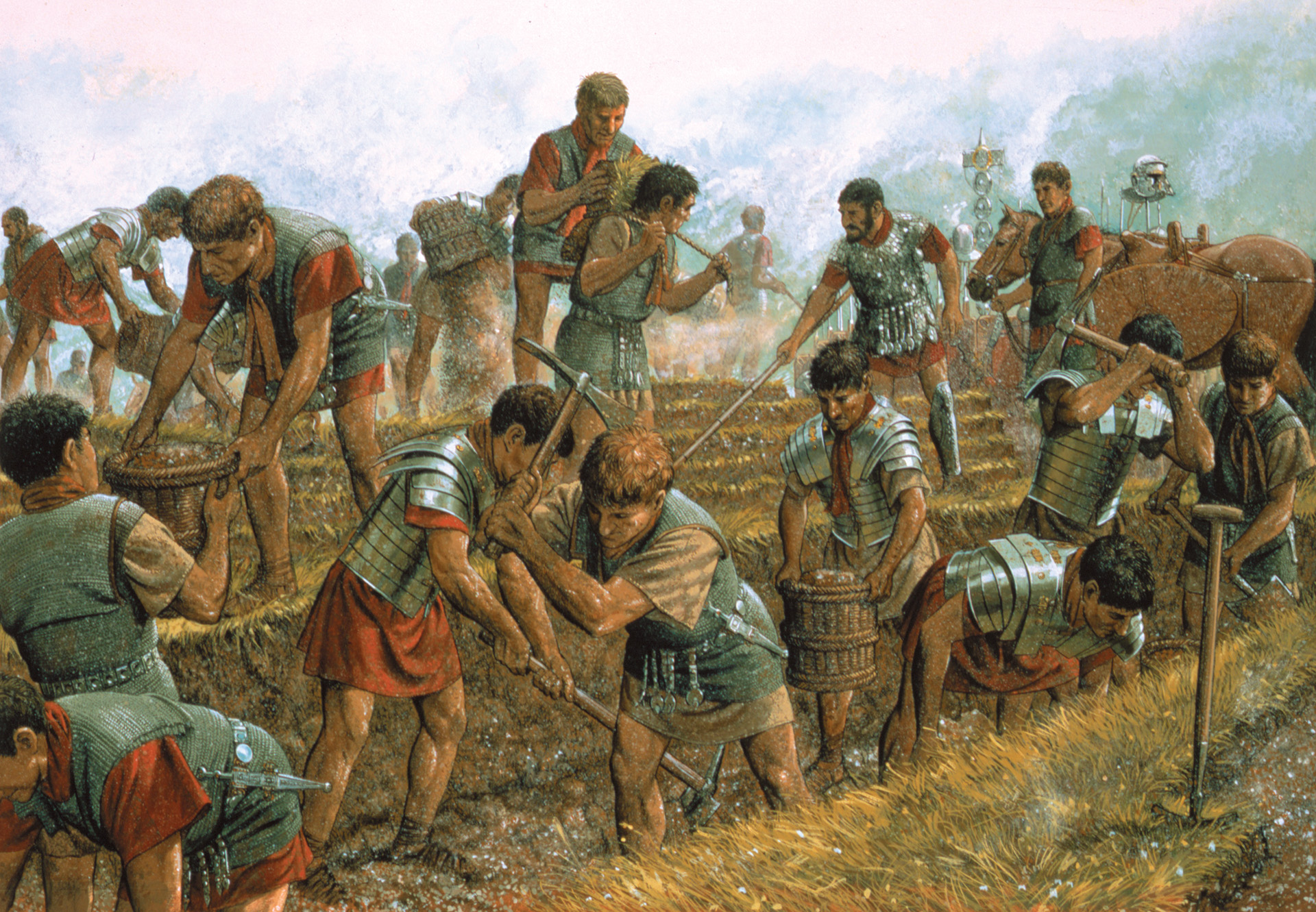
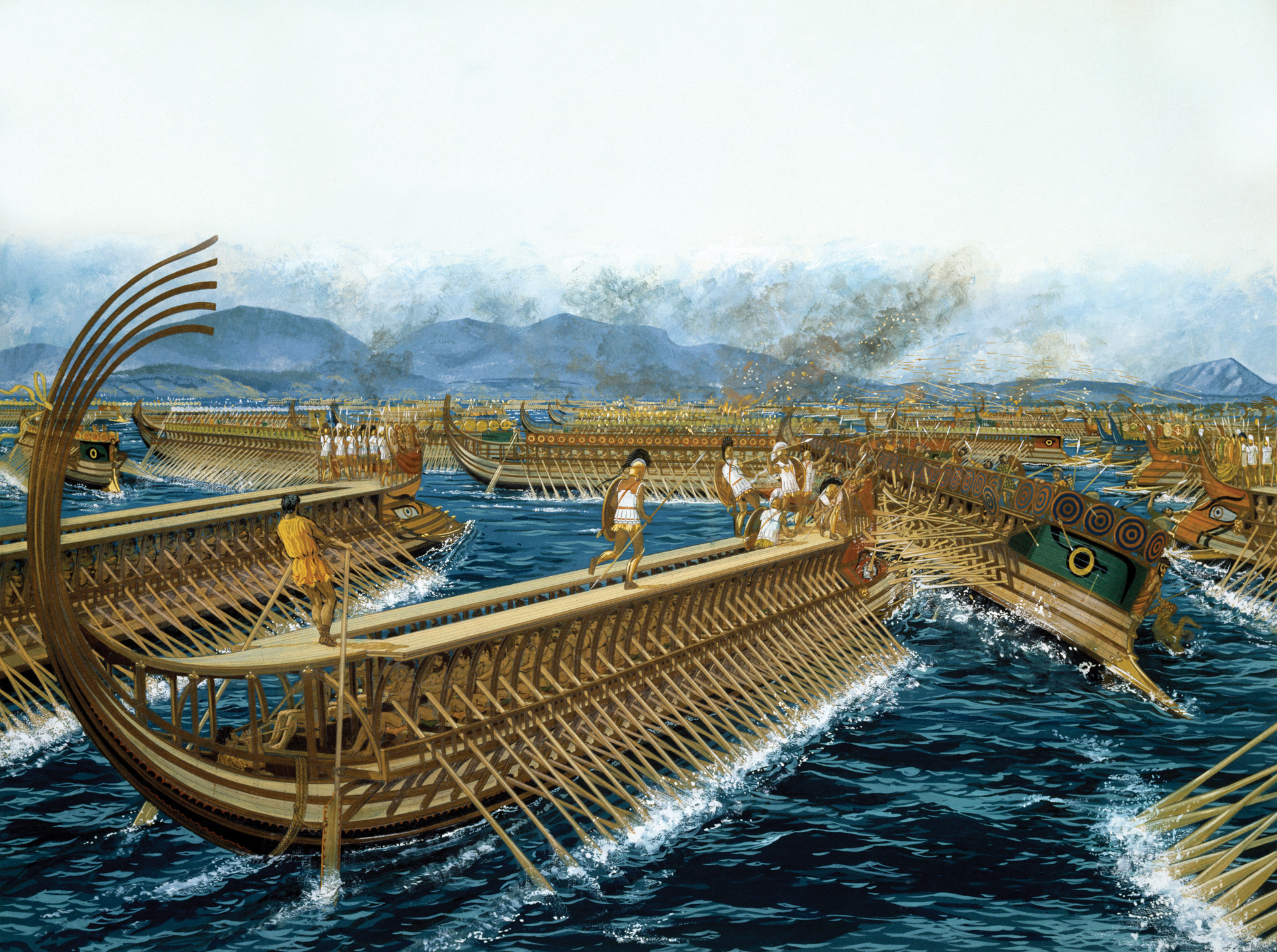
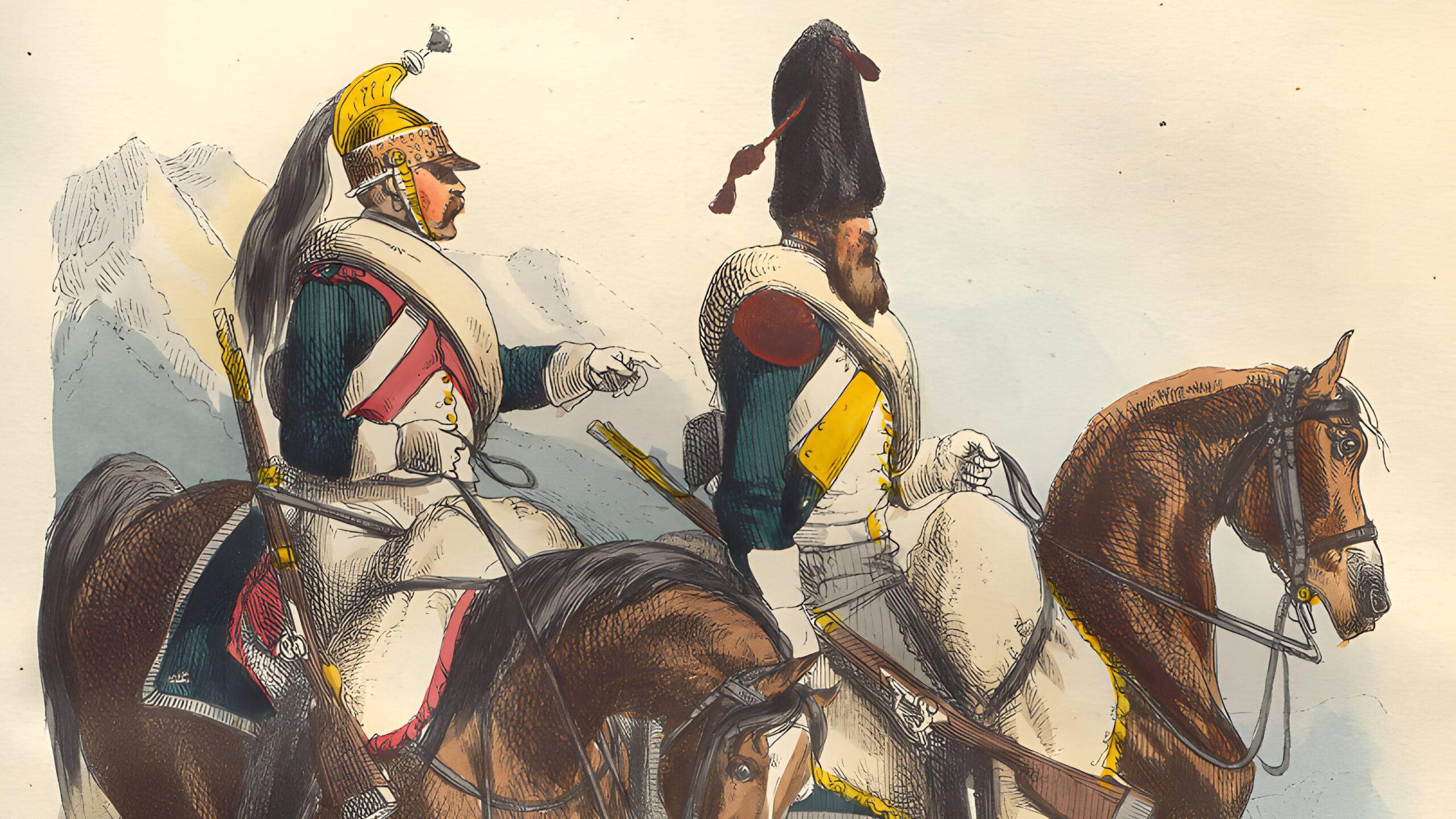
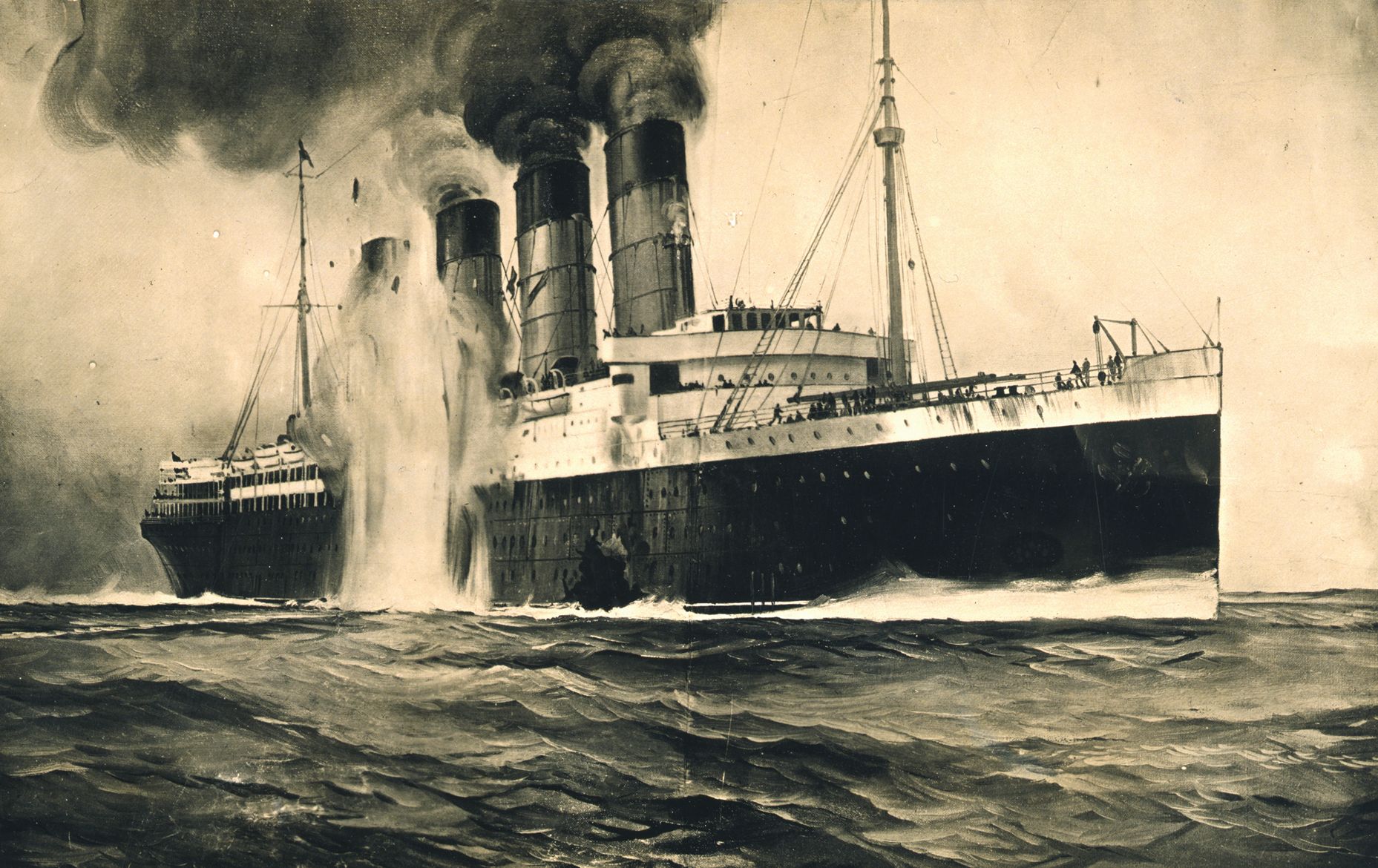
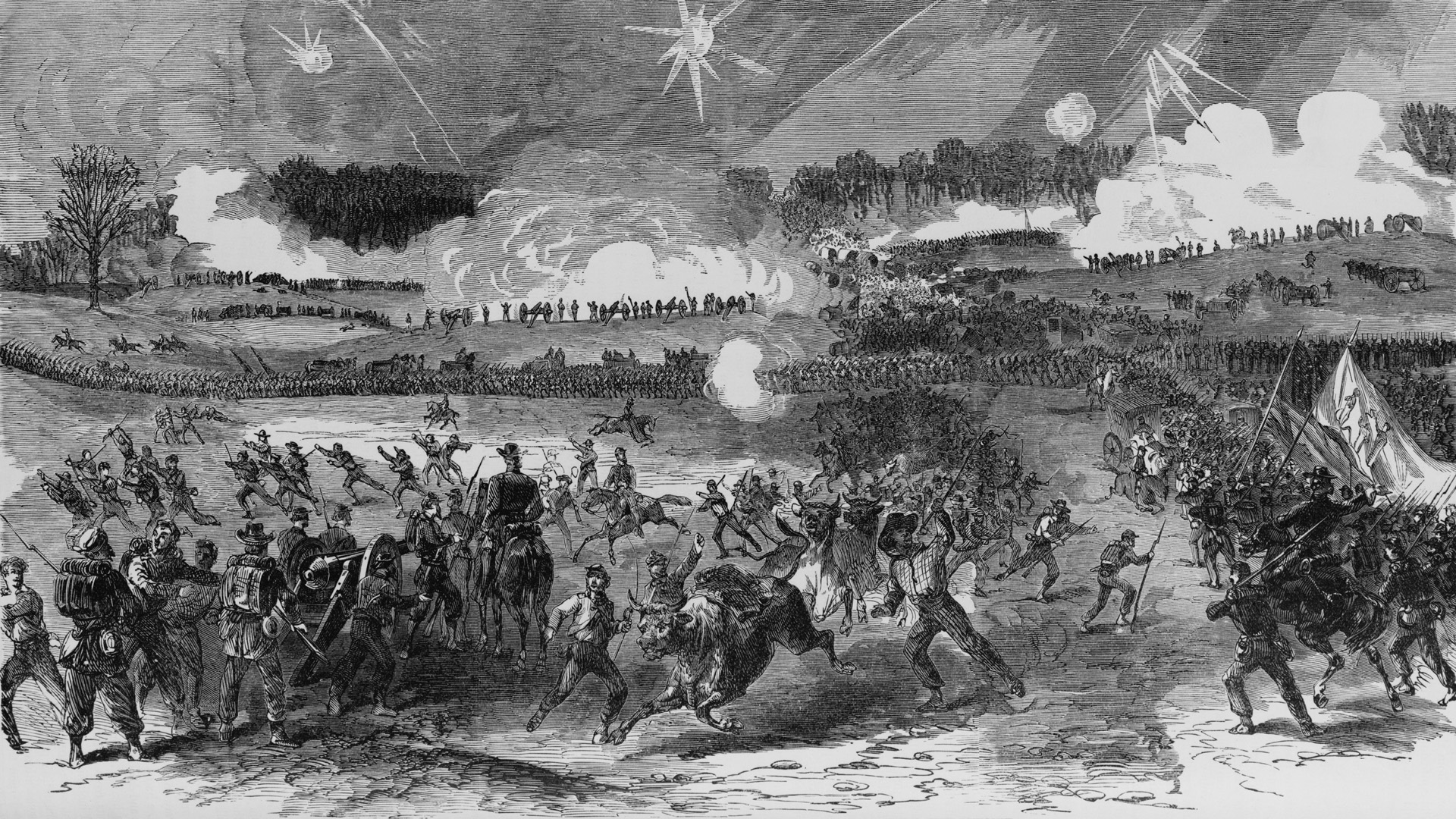
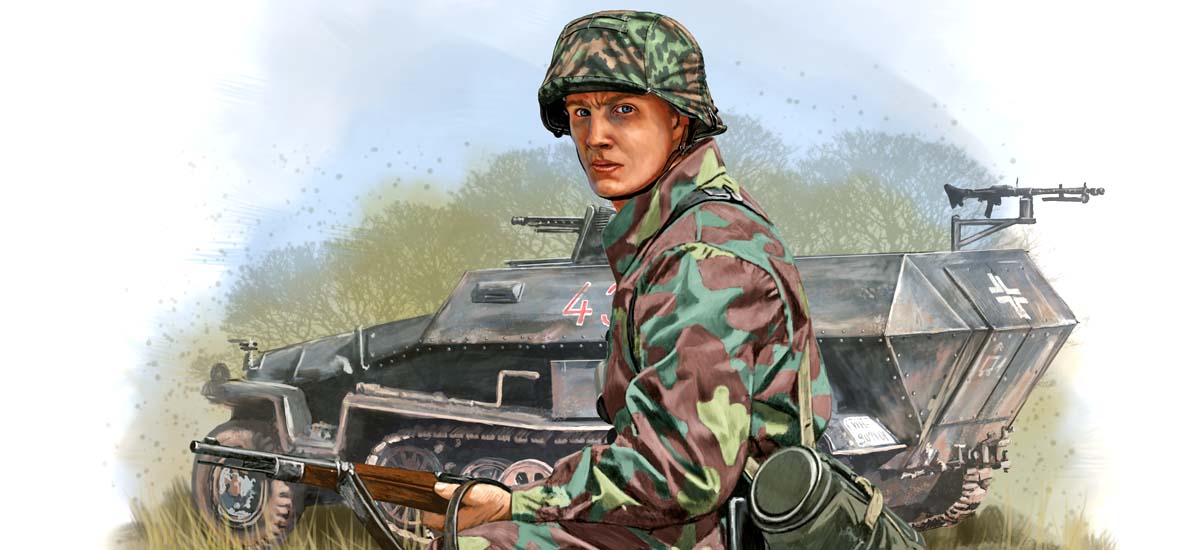
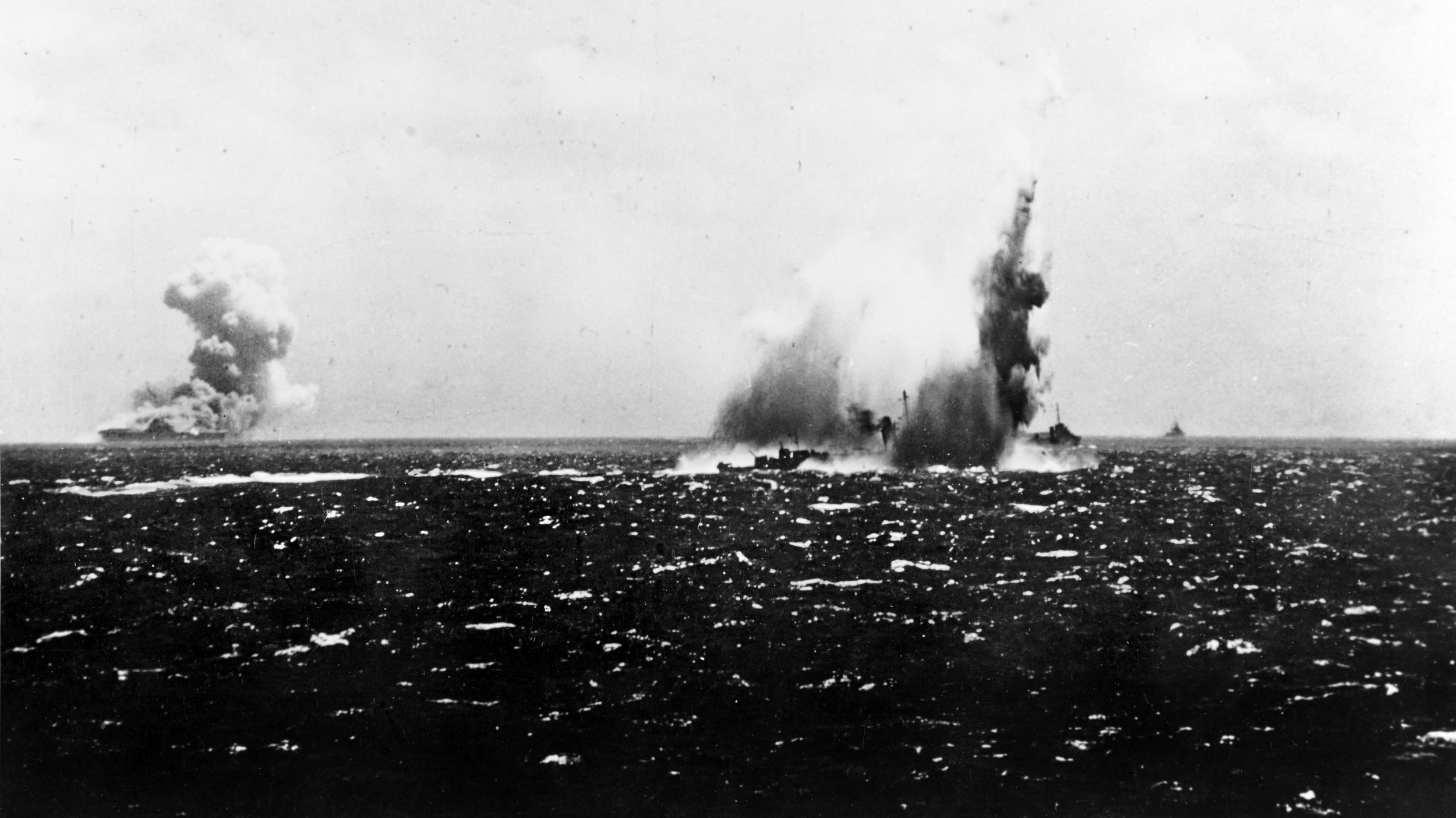
Join The Conversation
Comments
View All Comments